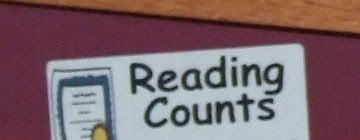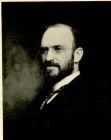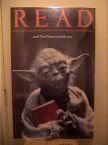


The greatest gift is the passion for reading.
It is cheap, it consoles, it distracts, it excites,
it gives you knowledge of the world and experience of a wide kind.
It is a moral illumination.
Elizabeth Hardwick
Elizabeth Hardwick at librarysupportstaff.com
In a Library, It's All in the Numbers--The Dewey Decimal Classification System
Let's say that you have ten minutes to visit a library, find a book, and check it out? How would you like to go into a library where all the books were up on the shelves in willy-nilly fashion? That is, in no particular order. On one shelf you might have a biography of Elvis Presley, next to a history of tuna fishing in Peru, next to a book about having turtles as pets, next to a book on India, next to a book on the Pyramids in Egypt, next to a book on clown colleges in America and so on.
Well you get the idea. Nothing in that imaginary library is organized. Any book can be anywhere or seemingly nowhere. In such a library,you could only find what you want to read by LUCK.
But thanks to a man named Melvil (you think that with a name like Melvil, he had to fight a lot of bullies as a kid; I do) Dewey,we don't have to worry about luck. Read on about Mr. Dewey.
Dewey, Melvil, 1851–1931, American library pioneer, originator of the Dewey decimal system, b. Adams Center, N.Y., grad. Amherst (B.A., 1874; M.A., 1877). A man of originality and of enormous energy,  Dewey played an important role in the early days of library organization in the United States. He became acting librarian of Amherst in 1874, and there he evolved his system of classification, using numbers from 000 to 999 to cover the general fields of knowledge and designating more specific subjects by the use of decimal points. From 1883 to 1889 he was librarian of Columbia College where he established the first library training school (now defunct). As librarian (1889–1906) at the New York State Library at Albany he founded another important library school. His interests extended from spelling reform to organizing the Lake Placid Club, a resort in the Adirondacks. Dewey is credited with the invention of the vertical office file. He was a founder of the American Library Association, the New York State Library Association, and the Library Journal. The 20th edition of his Dewey Decimal Classification and Relative Index (1876) was published in 1989. (Colombia University Press at Answers.com)
Dewey played an important role in the early days of library organization in the United States. He became acting librarian of Amherst in 1874, and there he evolved his system of classification, using numbers from 000 to 999 to cover the general fields of knowledge and designating more specific subjects by the use of decimal points. From 1883 to 1889 he was librarian of Columbia College where he established the first library training school (now defunct). As librarian (1889–1906) at the New York State Library at Albany he founded another important library school. His interests extended from spelling reform to organizing the Lake Placid Club, a resort in the Adirondacks. Dewey is credited with the invention of the vertical office file. He was a founder of the American Library Association, the New York State Library Association, and the Library Journal. The 20th edition of his Dewey Decimal Classification and Relative Index (1876) was published in 1989. (Colombia University Press at Answers.com)
Ahead are the basic subject groups which the Dewey Decimal Classification system has. Each of subject groups breaks down into more specific groups. At the Carlsbad Public Library, of course you can browse the shelves to look for books. Or you can use a computer to look up books by:
- Subject
- Title
- Author
- Power Search
- Dewey Decimal Number
- The holdings in seven other area Libraries available on inter-library loan
- and other ways
Learning to use the computer to search for library resources will prove to be very easy even for the person not used to using computers.
The Dewey Decimal Classification system is not the only library classification system used in libraries. The Library of Congress system is used in many librarie, including in our area, the New Mexico State University--Carlsbad and the Carlsbad Caverns National Park library, available for on-site use (no circulation of materials) by appointment
A couple other points to be made:
- The Dewey Decimal Classification sytems covers only non-fiction books, NOT fiction; fiction books--novels of the western, nystery, science fiction, historical, romance genre etc. are kept in certain sections and shelved alphabetically by the author's last name. While fiction books can be looked up in the computer by title or author, they do not have Dewey Decimal numbers. Some fiction, such as "[When birds could talk & bats could sing : the adventures of Bruh Sparrow, Sis Wren, and their friends" by Virginia Hamilton do have Dewey Decimal numbers, in this case: "J 398.245 HAM"
- The book "Moby Dick" is fiction and it would not have a Dewey Decimal #. When you looked it up, it would be referred to as FIC MEL; Now a book entitled "Readings on Moby Dick," a non-fiction book edited by Raymond and Loretta Obstfeld does have a Dewey Decimal #--813.3 REA." If a citation said "B MELVILLE HAR," it would not have a Dewey Decimal #. In this case, it would stand for a biography on Melville by Elizabeth Hardwick.
- A Dewey Decimal number with a "YA" prefix stands for "Young Adult" and with a "J" prefix stands for "Juvenile." These books are kept in separate sections of the library
- The more you gain experience with the Dewey Decimal system, the easier it would be to use presumably.
Using the DDC system below, answer these questions:
- Where would you find a history of New Mexico?
- Where would you find a book on Elvis Presley?
- Where would you find a book about the Supreme Court?
- Where would you find an algebra book?
- Where would you find a book about the Dewey Decimal System?
- Where would you find a book about supervision?
- Where would you find a book about Picasso?
Answers Below:
Dewey Decimal System of Classification ... Julia (Van Zanten) Sjöberg
- 000 Generalities
- 010 Bibliography
- 020 Library & information sciences
- 030 General encyclopedic works
- 040 Special topics
- 050 General serials & their indexes
- 060 General organizations & museums
- 070 New media, journalism, publishing
- 080 General collections
- 090 Manuscripts & rare books
- 100 Philosophy & psychology
- 110 Metaphysics
- 120 Epistemology, causation, humankind
- 130 Paranormal phenomena
- 140 Specific philosophical schools
- 150 Psychology
- 160 Logic
- 170 Ethics (moral philosophy)
- 180 Ancient, medieval, oriental philosophy
- 190 Modern western philosophy
- 200 Religion
- 210 Natural theology
- 220 Bible
- 230 Christian theology
- 240 Christian moral & devotional theology
- 250 Christian orders & local churches
- 260 Christian social theology
- 270 Christian church history
- 280 Christian denominations & sects
- 290 Other & comparative religions
- 300 Social Science
- 310 General statistics
- 320 Political science
- 330 Economics
- 340 Law
- 350 Public administration
- 360 Social problems & services
- 370 Education
- 380 Commerce, communications, transport
- 390 Customs, etiquette, folklore
- 400 Language
- 410 Linguistics
- 420 English & Anglo-Saxon languages
- 430 Germanic languages (German)
- 440 Romance languages (French)
- 450 Italian, Romanian, Rhaeto-Romanic
- 460 Spanish & Portuguese languages
- 470 Italic languages (Latin)
- 480 Hellenic languages (Classical Greek)
- 490 Other languages
- 500 Natural science & mathematics
- 510 Mathematics
- 520 Astronomy & allied sciences
- 530 Physics
- 540 Chemistry & allied sciences
- 550 Earth sciences
- 560 Paleontology & Paleozoology
- 570 Life sciences
- 580 Botanical sciences
- 590 Zoological sciences
- 600 Technology (applied sciences)
- 610 Medical sciences (Medicine, Psychiatry)
- 620 Engineering
- 630 Agriculture
- 640 Home economics & family living
- 650 Management
- 660 Chemical engineering
- 670 Manufacturing
- 680 Manufacture for specific use
- 690 Buildings
- 700 The arts
- 710 Civic & landscape art
- 720 Architecture
- 730 Sculpture
- 740 Drawings & decorative arts
- 750 Paintings & painters
- 760 Graphic arts (Printmaking & prints)
- 770 Photography
- 780 Music
- 790 Recreational & performing arts
- 800 Literature & rhetoric
- 810 American literature in English
- 820 English literature
- 830 Literature of Germanic language
- 840 Literatures of Romance language
- 850 Italian, Romanian, Rhaeto-Romanic Literatures
- 860 Spanish & Portuguese literatures
- 870 Italic literatures (Latin)
- 880 Hellenic literatures (Classical Greek)
- 890 Literatures of other languages
- 900 Geography & history
- 910 Geography & travel
- 920 Biography, genealogy, insignia
- 930 History of the ancient world
- 940 General history of Europe
- 950 General history of Asia (Far East)
- 960 General history of Africa
- 970 General history of North America
- 980 General history of South America
- 990 General history of other areas

Remember that all Dewey Decimal #'s narrow down to more specific categories. SUGGESTION: when you go to the library get on the computer and search Carlsbad Public Library for "New Mexico History" and see the variety of works we have and the various Dewey Decimal #s
Answers to Above Questions
970 General history of North America
- 920 Biography, genealogy, insignia
- 340 Law
- 510 Mathematics
- 020 Library & information sciences
- 650 Management
- 750 Paintings & painters
A library, to modify the famous metaphor of Socrates,

should be the delivery room for the birth of ideas - a place where history comes to life.
Norman Cousins
Norman Cousins at BrainyQuote
© Bob Hoff, 2006
No comments:
Post a Comment